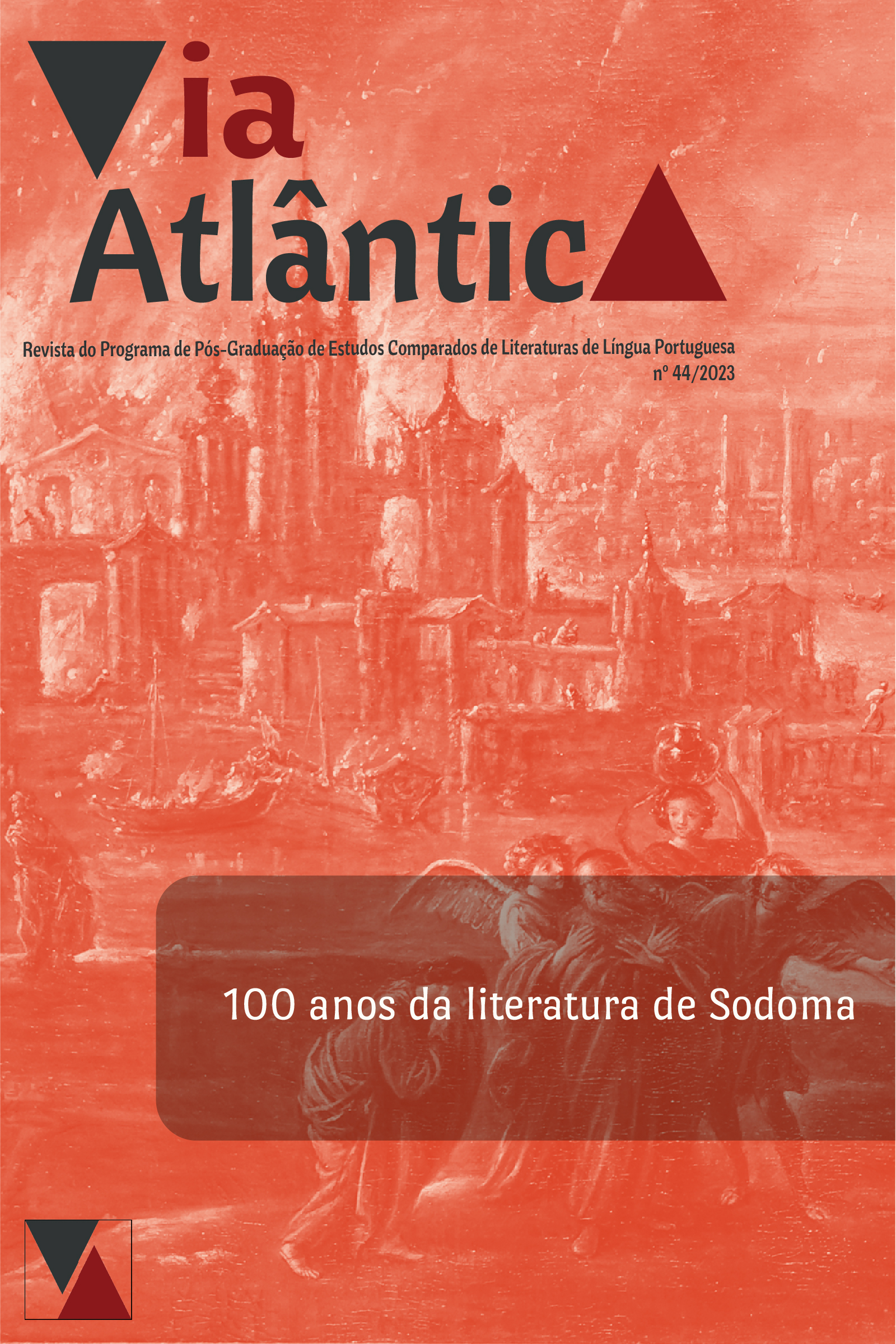The perverse and the poets: Literature of Sodom and surroundings
DOI:
https://doi.org/10.11606/va.i2.207160Keywords:
Judith Teixeira, Literature of Sodom, sexual dissidence, women's poetryAbstract
This article seeks to reexamine Judith Teixeira’s participation in the historical episode known as the “Literature of Sodom” through an extended contextualization of Teixeira’s poetic debut and the launching of Decadência. I argue that a more complete and nuanced understanding of Teixeira’s role in the 1922-23 events must take into account her belonging to two distinct colectives of sociocultural agents that were connected by her agency: the (male) “perverts” of the Portuguese modernism and the female “poetesses”, whose robust emergence in the literary marketplace of the early 1920s formed the inescapable context for the debut of the author of Decadência.
Downloads
References
ALBERTO, António. A nossa repugnância. Século da Noite. Lisboa, 19 fev. de 1923, s.p.
BARBOSA, Sara Marina. Quem tramou Judith Teixeira? (Uma história com fantasmas). estrema: revista interdisciplinar de humanidades – Centro de Estudos Comparatistas, Universidade de Lisboa, n. 4, p. 1-16, 2014. Disponível em: http://estrema.letras.ulisboa.pt/ojs/index.php/estrema/article/view/109. Acesso em: 22 de jan 2023.
BARRETO, José. Os destinatários dos panfletos pessoanos de 1923. Pessoa Plural – Brown University, Providence, RI, n. 10, p. 628-703, 2016. Disponível em: https://www.brown.edu/Departments/Portuguese_Brazilian_Studies/ejph/pessoaplural/Issue10/PDF/I10A23.pdf. Acesso em: 22 de jan 2023.
BOTTO, António. Canções/Songs. Trad. Fernando Pessoa. Orgs. Jerónimo Pizarro e Nuno Ribeiro. Lisboa: Guimarães, 2010.
CASCAIS, António Fernando. Uma leitura queer da conferência De Mim de Judith Teixeira. In SILVA, F. M. da, RITA, A., DAL FARRA, M. L., VILELA, A. L. e OLIVEIRA, A. M. (orgs.). Judith Teixeira: ensaios críticos. No centenário do Modernismo. Viseu: Edições Esgotadas, 2017, p. 85-115.
DIAS-SANCHO, José. Judith Teixeira fala-nos da sua Arte e das suas intenções. Revista portuguesa, n. 3, 24 de mar 1923, p. 16-18.
DIAS-SANCHO, José. Elas, as poetisas. Revista portuguesa, n. 13, 9 de jun 1923, p. 3-6.
GONÇALVES, Zetho Cunha, org. Notícia do maior escândalo erótico-social do século XX em Portugal. Lisboa: Letra Livre, 2014.
GOUVEIA E SOUSA, Martim Lourenço Ramos de. Judith Teixeira: Originalidade poética e descaso literário na década de vinte. Dissertação (Mestrado em Letras) – Departamento de Línguas e Culturas, Universidade de Aveiro, 2001.
KLOBUCKA, Anna M. Palmyra’s Secret Garden: Iberian (Dis)Connections, Portuguese Modernism, and the Lesbian Subject. Luso-Brazilian Review – University of Wisconsin, Madison, v. 50, n. 2, p. 31-52, 2013.
KLOBUCKA, Anna M. Pessoa arquiteto da Literatura de Sodoma: uma revisitação. In: Atas do Congresso Internacional Fernando Pessoa. Lisboa: Casa Fernando Pessoa, 2017, p. 68-76.
KLOBUCKA, Anna M. Entre mulheres: Virgínia Victorino e a poesia “feminina” portuguesa na década de 1920. In LOUSADA, I. e SAMPAIO, J. P. (orgs.). In: Actas Colóquio Internacional Virgínia Victorino: Na Cena do Tempo. Alcobaça: ADEPA, 2019, p. 211-236.
LUGARINHO, Mário César. “Literatura de Sodoma”: o cânone literário e a identidade homossexual. Gragoatá – UFF, n. 14, 2003, p. 133-145.
MARQUES, Ricardo. Contemporânea. In Modern!smo. Arquivo virtual da geração de Orpheu. Disponível em https://modernismo.pt/index.php/contemporanea. Acesso em 2 de jan 2023.
MONCÓVIO, Susana Simões. Luise Ey (1854-1936): aspetos biográficos de uma divulgadora de Eça de Queirós na Alemanha. Revista de Portugal, n. 14, 2017, p. 7-22.
MONTALVOR, Luís de. Tentativa de um ensaio sobre a Decadência. In Centauro. Edição facsimilada. Lisboa: Contexto, 1982, p. 7-12.
PAZOS ALONSO, Cláudia. Imagens do Eu na Poesia de Florbela Espanca. Lisboa: IN-CM, 1996.
PAZOS ALONSO, Cláudia. Modernist Differences: Judith Teixeira and Florbela Espanca. In DIX, S. e PIZARRO, J. (orgs.). Portuguese Modernisms: Multiple Perspectives on Literature and the Visual Arts. London: Legenda, 2011, p. 122-134.
PESSOA, Fernando. Correspondência 1923-1935. Ed. Manuela Parreira da Silva. Lisboa: Assírio & Alvim, 1999.
RAMOS, Rui. A Segunda Fundação (1890-1926), vol. 6 de História de Portugal, dir. José Mattoso, ed. revista e atualizada. Lisboa: Estampa, 2001.
RICH, Adrienne. Heterossexualidade compulsória e existência lésbica. Trad. Carlos Guilherme do Valle. Bagoas - Estudos gays: gêneros e sexualidades, v. 4, n. 5, 2012, p. 17-44.
SALGUEIRO, Anabela de Campos, e BORGES, Inês da Conceição do Carmo. Estrada da Luz. Obra poética e iconográfica de Branca de Gonta Colaço. Coimbra: Pallimage, 2017.
SAMPAIO, Jorge Pereira de. Virgínia Victorino. Vida e obra. Alcobaça: ADEPA, 2019.
SCHAFFNER, Anna Katharina. Modernism and Perversion: Sexual Deviance in Sexology and Literature, 1850-1930. New York: Palgrave Macmillan, 2012.
TEIXEIRA, Judith. Poemas. Lisboa: &etc, 1996.
TEIXEIRA, Judith. Poesia e prosa. Orgs. ALONSO, C. P. e SILVA, F. M. da. Lisboa: Dom Quixote, 2015.
ZENITH, Richard. Pessoa: A Biography. New York: Liveright, 2021.
Downloads
Published
Issue
Section
License
Copyright (c) 2023 Anna M Klobucka

This work is licensed under a Creative Commons Attribution 4.0 International License.
Authors who publish with this journal agree to the following terms:
- Authors retain copyright and grant the journal right of first publication with the work simultaneously licensed under a Creative Commons Attribution License that allows others to share the work with an acknowledgement of the work's authorship and initial publication in this journal.
- Authors are able to enter into separate, additional contractual arrangements for the non-exclusive distribution of the journal's published version of the work (e.g., post it to an institutional repository or publish it in a book), with an acknowledgement of its initial publication in this journal.
- Authors are permitted and encouraged to post their work online (e.g., in institutional repositories or on their website) prior to and during the submission process, as it can lead to productive exchanges, as well as earlier and greater citation of published work (See The Effect of Open Access).



















